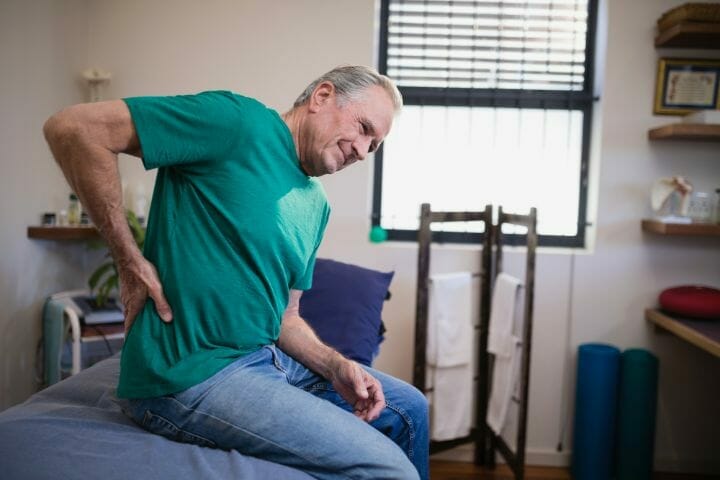is a bone disease that occurs when the body loses too much bone, generates too little bone. It could also be a combination of both these factors, where a loss of occurs.
According to the World Health Organization, is defined on the basis of a T score where-
- -0.1 to +1 means you have a normal bone density
- Between -1 and -2.5 shows low bone mass
- -2.5 or lower indicates .
Contents
Common Symptoms of O
The symptoms of are:
- Intense back pain due to a collapsed/fractured vertebra
- A decrease in height over time
- Stooped posture development
- Fragile that are highly susceptible to fracture risk
- Receding gums and bone loss in the jaw
However, these symptoms of can be reversed with a balanced and nutritious diet, weight-bearing exercises, and the use of and supplements to boost bone health. Adopting a healthier lifestyle is an important part of overcoming this condition.
can show severe symptoms if not treated properly. The severe symptoms include:
- Issues with limited mobility
- Chronic pain in the back and other related areas
- Increased risk of hip fracture/vertebral fracture
What Are the Factors Influencing B
There are certain factors that are responsible for in an individual
- Genetic makeup on an individual
- Smaller or thinner body frame
- Physical activity
- The medications you have used/are using
- Diet and routine
You might also like Intermittent Fasting and Osteoporosis
Is It Possible to Reverse O in 6 Months?
If you’re wondering whether osteoporosis can be reversed, you need to take into account where you stand on your T-score.
If you are sitting on the edge of osteoporosis (-2.5 to -2.9), it is possible to increase bone density and move into osteopenia territory with the right combination of exercise and diet. If you are able to increase your bone density to the point where your new score indicates you have osteopenia, you could think of it as having reversed osteoporosis to an extent.
In order to reverse and prevent osteoporosis you need to ensure 3 things:
- Consume a calcium-rich diet: Your bone is living tissue and there is a continuous cycle of bone breakdown and bone formation, so intake of a calcium-rich diet is a must for normal bone density and bone mass
- Regular exercise and gym: Weight-bearing exercise through regular gym and exercise helps in the reduction of bone loss.
- Maintain proper body alignment– using ergonomic chairs can provide significant improvement.
These factors can also be considered for the effective management of osteoporosis in the elderly. In any case, we recommend that you get a bone density scan (Dexa scan) to check your bone mineral density and assess your risk of a hip fracture or osteoporosis fracture.
Now, regarding the timeline, it is difficult to say that you can reverse osteoporosis within a particular time frame.
Can Lifestyle Changes Reverse O?
is a disease that is not curable, however, the effects of can be minimized by adopting lifestyle changes. Management of osteoporosis and living well with osteoporosis is dependent on other factors as well. Some of the lifestyle changes that can help reverse and boost absorption include the following:
- Consuming a diet rich in legumes, beans, and grains along with limited use of animal protein
- Reduce consumption of caffeine-rich beverages and alcohol
- Cutting down on smoking
- Regular gym routine that includes weight-bearing exercises
- Increased exposure to sunlight
- V and supplements
You might also like Does Osteoporosis Affect Teeth and Nails?
How Can I Reverse My O?
Lifestyle modifications and appropriate supplementation can help in minimizing bone loss and related consequences. In a nutshell, these are the ways to reverse :
Diet Changes
Make sure that you consume a nutrient-rich diet that helps maintain and . A good diet plan for osteoporosis helps in keeping your bones strong.
Take a look at the broad group of foods below that need to be consumed in order to have healthy and strong bones:
- Fruits and vegetables
- Dairy products
- Protein
Some minerals are also necessary to intake along with the above-mentioned food. This can be taken as a natural source or through supplements.
-one of the most important mineral for the health of . Make it a point to consume plenty of leafy vegetables such as broccoli and dairy products that are enriched with . These foods stimulate and increase .
– This is necessary to regulate in the body. Fish are the rich sources of . levels in your body can be naturally increased by regular exposure to sunlight.
In order to improve , you need to cut down on some habits that are detrimental to . Here’s a look at what these are:
- Caffeine- Excess consumption of caffeine majorly affects the processing of in the body.
- Soda- Fizzy drinks like carbonated water and cola need to be eliminated from your diet as they are found to be associated with the loss of . These foods and drinks are also associated with obesity. Obesity can be a risk factor for osteoporosis in adults.
- Alcohol-Alcohol consumption greatly contributes to and deteriorating health, apart from causing a host of other health issues, and is hence not recommended to be taken regularly.
You might also like CBD Oil for Osteoporosis – Benefits and Options
Regular Exercise
Weightbearing exercise and regular gym help in strengthening the . Regular exercise helps your body to stay coordinated and balanced. This will eventually lead to strong bones and prevents , , and related issues.
- Weight-bearing exercises- These include aerobic exercises such as dancing, Yoga, swimming which can effectively strengthen bones and prevent bone density loss. Swimming is good for osteoporosis and many health experts suggest that swimming and yoga are activities that can help increase muscle strength and bone density.
- Resistance training exercises- These exercises usually require weight or resistance bands to strengthen the bones.
- Stretching-Stretching the body increases the flexibility of joints.
We recommend that you avoid high-impact exercises and all exercises should be modified according to the patient’s body type and intensity of bone disease to avoid any injury.
Discarding Unhealthy Habits
A set of healthy habits helps you prevent and gives you , prevents , and strengthens aside from improving overall health.
Avoid intake of too much alcohol and other beverages. The next important factor would be to quit smoking. Also, avoid eating junk foods that deter .
Consuming the Required Supplements
We recommend that you check your Vitamin D levels and take Calcium and Vitamin D supplements if you do not have adequate levels. An adequate level of minerals and vitamins are needed to maintain the health of bone cells and Vitamin D and calcium are the most important among them.
You might also like Apple Cider Vinegar and Osteoporosis – A Complete Guide
Has Anyone Ever Reversed Osteoporosis?
Here’s a guide to reversing through a series of steps; these can help you to stop and
- Conduct a b
- Lifestyle and dietary changes
- Nutritional supplements
- Regular physical activity
- Adapting steps of home safety
- Intake of o
In addition to these, you can incorporate the following steps to reverse and maintain .
- Cut down on sugary beverages: Soft drinks and alcohol could be triggering your . Minimize consumption of unhealthy foods, aerated drink, and sugar for overall health.
- Reduce excess protein: Reduce excess protein from your diet since it causes acidity in your body. It can cause you to lose through urine, leading to an increase in the for and .
- Consume adequate Adequate is necessary, and carbonate is very poorly absorbed in the body. hydroxyapatite and citrate are the best forms of intake and it is wise to consume supplements for osteoporosis that contains Calcium, Vitamin D3, Vitamin K2, Boron, and Magnesium.
- Sunlight exposure: It is the best and most natural source of .
You might also like Difference Between Osteoporosis and Osteomalacia
- Get your hormone levels checked: Ensure that hormones are not wreaking havoc on your bone strength and resulting in . For example, low estrogen levels can be a cause for concern, especially in a post-menopausal woman. It would be wise to research how does estrogen affects osteoporosis and causes a decline in bone mass.
- Stick to a Diet Plan: Making lifestyle changes and changing your unhealthy diet helps in making bones stronger. We suggest that you follow a seven-day diet plan for osteoporosis that can improve your quality of life and minimize the effects of osteoporosis.
- Reduce your stress level: Exercise such as isometric exercises, tai chi, and yoga have wonderful benefits on your mind and can greatly contribute to mental health. Stress increases cortisol and this can contribute to aggressive loss of . You can invest in some DVDs on Yoga for osteoporosis management and to increase the strength and flexibility of your body.
- Physical activity: Make exercise a part of your life. Weight-bearing exercises including stretching and wearing weighted vest are seen to have a significant impact on , especially in women. Keep your body moving to increase the agility and strength of muscles. Also, avoid stooping while sitting as it adversely affects your joints by putting unnecessary strain on them.
You might also like What is the Difference Between Osteoarthritis and Osteoporosis?
Conclusion
Your diagnosis of osteoporosis is based on your bone mineral density (BMD) scores. However, BMD is only a partial measurement of the health of your bones.
can be minimized by making lifestyle changes, taking appropriate supplements, and exercise. is not a condition that can be wholly reversed through diet intake and hence supplements are necessary to reverse it and maintain .
An exercise and diet program can take months to affect bone density and the rate of change is slow. Pharmaceutical intervention may increase your bone density although it cannot improve the quality of your bone.
Team HelpandWellness recommends that you get a ; a that will help you work out your bone health and risk of . A can alert you to find out the of , , , etc, so that a doctor can assess what you might benefit from.




